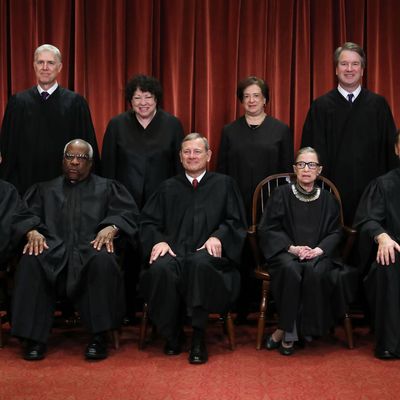
In his strange, rambling, interminable press conference that sorta kinda announced his decision to declare a national emergency so that he can raid military construction accounts for border-wall money, President Trump acknowledged that this move will immediately spur litigation, and even that lower federal courts would initially stymie him. But he expressed confidence that the Supreme Court would eventually back him just as it did in the case of a revised travel ban that had been voided by lower courts.
Sadly, we’ll be sued and sadly it will go through a process and happily we’ll win, I think.
This means that Trump is admitting that his declaration isn’t going to accomplish much of anything (other than making his nativist “base” happy) until the litigation is complete. More importantly, he did his legal case little good in publicly trying to justify the emergency declaration, as the husband of his senior counselor quickly noted:
There will be many complaints filed, no doubt, including one emanating from the House and Senate Democrats who trounced Trump in the battle over border-wall funding, as a joint statement by Nancy Pelosi and Chuck Schumer indicates:
The President’s unlawful declaration over a crisis that does not exist does great violence to our Constitution and makes America less safe, stealing from urgently needed defense funds for the security of our military and our nation …
The President’s actions clearly violate the Congress’s exclusive power of the purse, which our Founders enshrined in the Constitution. The Congress will defend our constitutional authorities in the Congress, in the Courts, and in the public, using every remedy available.
Aside from the president’s admission that he didn’t really need to declare a national emergency, the factual case for it is weak, and wasn’t exactly cleared up by Trump’s weird confrontation with reporters over immigration and crime statistics emanating from his own administration. He all but said that his evidence that there is a border crisis is that he thinks there is one, as his testy exchange today with CNN’s Jim Acosta indicated:
Trump’s best hope in court is that judges (and presumably SCOTUS) will take the traditional deference to the president’s national-security authority and combine that with express congressional delegation of emergency powers to give him virtual carte blanche in situations like this, without much of a look at the underlying facts. University of California Law Professor John Yoo, a fan of extensive presidential powers (if not always a fan of Trump), thinks it’s a winning argument:
Congress has not passed a law denying the President the authority to take measures to protect the border; in fact, in 2006 Congress passed a law by bipartisan majorities authorizing the construction of a wall. In Dames & Moore v. Regan (1981), the Court found that when Congress broadly delegates a general power to the executive branch in the area of foreign affairs, such as the power to impose economic sanctions, it would not read Congress’s neglect to grant a more specific, related authority as foreclosing the president from exercising that authority. Instead, it would treat Congress’s silence as acquiescence to presidential initiative, especially in times of emergency. That is exactly the case here: Congress has authorized a wall and other security measures at the border, it has not passed any law forbidding such a wall, and the president has invoked delegated powers to continue the wall’s construction.
In this construction of the law, Trump’s action would be allowed by the Courts despite his blundering efforts to justify it, and the authoritarian attitude he so alarmingly illustrated today in his rare moments of coherence.
There will be other challenges to this action in Congress (which can overrule an emergency declaration) and in the court of public opinion. But it’s an open question what SCOTUS will do with this hot potato if it arrives on its docket.






























